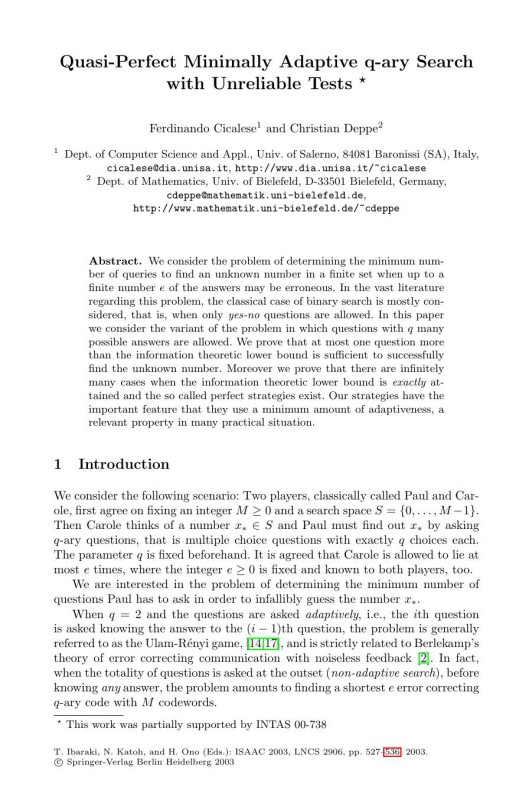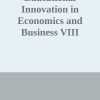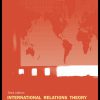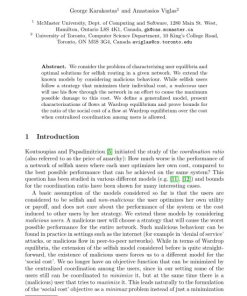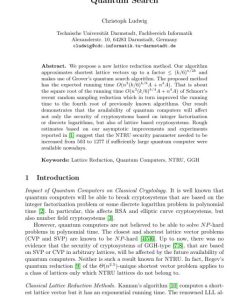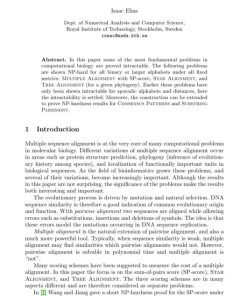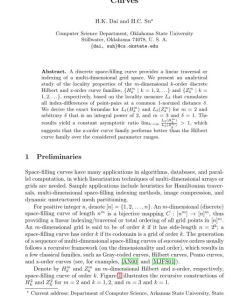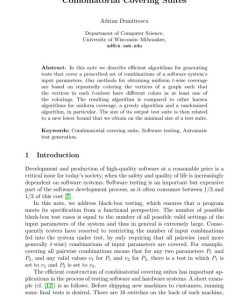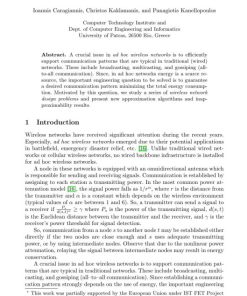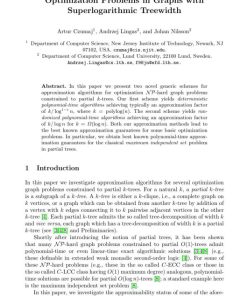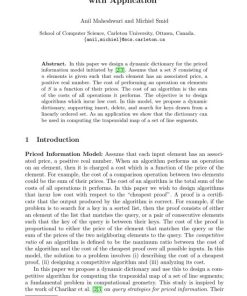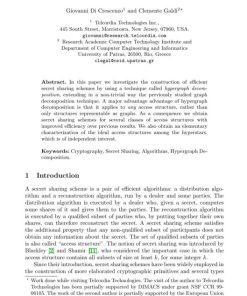Quasi Perfect Minimally Adaptive q ary Search with Unreliable Tests 1st edition by Ferdinando Cicalese, Christian Deppe ISBN 3540206958 9783540206958
$50.00 Original price was: $50.00.$25.00Current price is: $25.00.
Authors:Ferdinando Cicalese; Christian Deppe , Tags:Algorithms and Computation , Author sort:Cicalese, Ferdinando & Deppe, Christian , Languages:Languages:eng , Published:Published:Oct 2003
Quasi Perfect Minimally Adaptive q ary Search with Unreliable Tests 1st edition by Ferdinando Cicalese, Christian Deppe – Ebook PDF Instant Download/Delivery. 3540206958 , 978-3540206958
Full download Quasi Perfect Minimally Adaptive q ary Search with Unreliable Tests 1st Edition after payment

Product details:
ISBN 10: 3540206958
ISBN 13: 978-3540206958
Author: Ferdinando Cicalese, Christian Deppe
We consider the problem of determining the minimum number of queries to find an unknown number in a finite set when up to a finite number e of the answers may be erroneous. In the vast literature regarding this problem, the classical case of binary search is mostly considered, that is, when only yes-no questions are allowed. In this paper we consider the variant of the problem in which questions with q many possible answers are allowed. We prove that at most one question more than the information theoretic lower bound is sufficient to successfully find the unknown number. Moreover we prove that there are infinitely many cases when the information theoretic lower bound is exactly attained and the so called perfect strategies exist. Our strategies have the important feature that they use a minimum amount of adaptiveness, a relevant property in many practical situation.
Quasi Perfect Minimally Adaptive q ary Search with Unreliable Tests 1st Table of contents:
-
Introduction
- 1.1 Overview of Search Algorithms
- 1.2 The Concept of Minimally Adaptive Search
- 1.3 Quasi Perfect Search: Definition and Context
- 1.4 Handling Unreliable Tests in Search Problems
- 1.5 Motivation and Applications of the Study
- 1.6 Structure of the Paper
-
Background and Related Work
- 2.1 Classical q-ary Search Techniques
- 2.2 Adaptive Search Strategies: Theory and Practice
- 2.3 Minimally Adaptive Search Algorithms
- 2.4 Models of Unreliable Testing in Search Problems
- 2.5 Previous Work on Quasi Perfect Search in Error-Prone Environments
-
Formal Definition of Quasi Perfect Minimally Adaptive Search
- 3.1 Problem Formulation and Assumptions
- 3.2 Definitions of Quasi Perfect Search and Minimally Adaptive Search
- 3.3 Characteristics of q-ary Search in Unreliable Test Scenarios
- 3.4 Decision Trees and Search Trees in Adaptive Search
- 3.5 Reliability Models for Tests and Their Impact on Search Efficiency
-
Theoretical Analysis of Quasi Perfect Minimally Adaptive q-ary Search
- 4.1 Optimality and Bounds for Quasi Perfect Search
- 4.2 Minimizing the Number of Tests: Theory of Adaptive Search
- 4.3 Error Models and Their Influence on Search Algorithms
- 4.4 Analysis of Worst-Case Scenarios for Unreliable Tests
- 4.5 Trade-offs Between Search Efficiency and Test Reliability
-
Designing Quasi Perfect Minimally Adaptive Search Algorithms
- 5.1 Basic Framework for Algorithm Design
- 5.2 Handling Unreliable Tests in Search Algorithms
- 5.3 Recursive and Non-Recursive Search Approaches
- 5.4 Optimizing Search Trees for Reliability and Efficiency
- 5.5 Algorithmic Complexity and Performance Evaluation
-
Practical Applications of Minimally Adaptive Search
- 6.1 Applications in Computer Science: Data Retrieval and Database Search
- 6.2 Search in Communication Networks with Faulty Nodes
- 6.3 Minimally Adaptive Search for Error-Prone Sensors or Devices
- 6.4 Applications in Bioinformatics and Large-Scale Data Analysis
- 6.5 Case Studies of Search Problems with Unreliable Tests
-
Experimental Results and Evaluation
- 7.1 Experimental Setup and Testbed for Quasi Perfect Search Algorithms
- 7.2 Performance of Minimally Adaptive Search with Unreliable Tests
- 7.3 Comparison with Classical Search Algorithms
- 7.4 Sensitivity to Test Reliability and Search Efficiency
- 7.5 Empirical Results on Algorithm Scalability and Real-World Applications
-
Advanced Topics in Minimally Adaptive q-ary Search
- 8.1 Generalizing to Higher Dimensions or Multi-Parameter Search Problems
- 8.2 Multi-Agent Search Strategies in Unreliable Environments
- 8.3 Hybrid Search Models: Combining q-ary and Binary Search
- 8.4 Probabilistic Search with Unreliable Tests: Techniques and Models
- 8.5 Adaptive Search in Stochastic and Noisy Environments
-
Challenges and Open Problems
- 9.1 Computational Complexity of Minimally Adaptive Search in Unreliable Environments
- 9.2 Unresolved Issues in Balancing Efficiency and Reliability
- 9.3 Open Problems in Search Algorithm Optimization for Error-Prone Systems
- 9.4 Future Directions in Adaptive Search Theory and Algorithms
- 9.5 Potential Breakthroughs in Quasi Perfect Search Models
-
Conclusion
- 10.1 Summary of Findings on Quasi Perfect Minimally Adaptive Search
- 10.2 Contributions to Search Theory and Algorithm Design
- 10.3 Practical Implications for Real-World Applications
- 10.4 Final Thoughts on Future Research in Adaptive Search with Unreliable Tests
People also search for Quasi Perfect Minimally Adaptive q ary Search with Unreliable Tests 1st:
quasi-minimal residual method
quasi-perfect meaning
v-paced with non-sensing
quasi-three-dimensional model
8-dimensional quasicrystal

